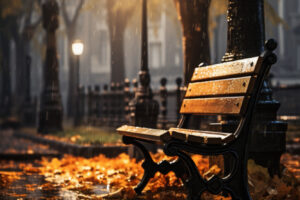Cognitive health requires new growth
Spring is a time of planting seeds and nurturing the new growth. Similarly, the later decades of life are a time to cultivate the budding aspirations that blossom from the first few decades of our lives. We get better with age from the inside out by making sense of our life story. Our mental and cognitive health depend on this inner work.
The 20th century psychologist Erik Ericson developed a theory of psychosocial development over the human lifespan. In his approach, Erikson emphasized the role of culture and society. Adulthood over age 40 is a struggle to choose generativity over stagnation, and wisdom over despair.
Default network more active over age 40
Around age 40, our brain switches gears on us. Brain activity in the default network (in charge of our autobiographical memory and personal story) becomes more active. The default network is synchronized activity linking three major regions of the brain: the parietal lobe, the temporal lobe, and the frontal lobe.
In the decades over age 40, the brain deliberately slows down to help us gather a harvest of wisdom from our life experiences to share with others. This process enables our brain to get better with age to benefit the next generation.
While the causes of Alzheimer’s disease remain unclear, it is understood to be a malfunction of the default network, a disease that disrupts our identity and consciousness.
The most important cognitive health habit we can build over age 40 is to take charge of our personal story. Nostalgia as well as rumination about past setbacks can bubble up. The inner narrative (what we say to ourselves when we look in the mirror) must be a success story, a tale of setbacks followed by comebacks.
Successful mid-life transition 
For example, consider the life story of Elizabeth Taylor, who died in 2011 at age 79 from congestive heart failure. She was married 8 times to seven different men, had four children and at least 20 major operations.
At midlife, she transitioned from a successful acting career to celebrity-brand merchandising and social advocacy for people with AIDS. She died with a net worth over $500 million, little of which came from acting.
At age 55, Liz disclosed in an interview a secret of her successful mid-life transition: “Eventually the inner you shapes the outer you. Life is to be embraced and enveloped. Surgeons and knives have nothing to do with it. It has to do with a connection with nature, God, your inner being-whatever you want to call it-it’s being in contact with yourself and allowing yourself, allowing God, to mold you.”
To take charge of your cognitive health, take charge of your personal story. Stay focused on the events of your life that make you proud. Life experiences can be reconsidered, reframing significant losses in a positive way. Forgiveness and reconciliation can be embraced when relationships cannot be mended. Guilt and shame can be shed like old clothes. And make a plan to ensure that the next chapter of your story is the best one yet!






